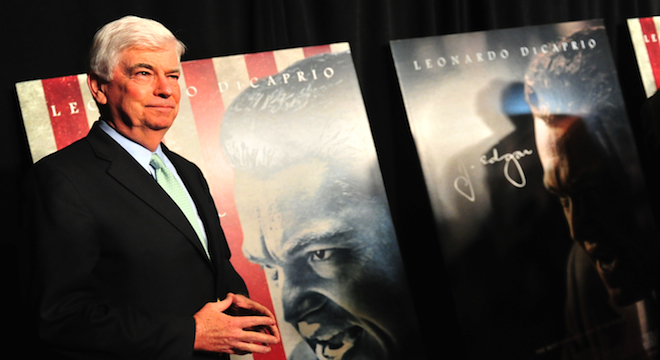The battle over anti-piracy legislation in Washington may have cooled following the mass online protests on January 18 and subsequent loss of support in Congress, but former Senator Chris Dodd (D-CT) remains on the hot seat over his role in the fight.
Dodd, current president of the MPAA, is the target of an online petition calling for the Obama Administration to “investigate Chris Dodd and the MPAA for bribery after he publicly admited to bribing politicans to pass legislation.”
There is no evidence that Dodd bribed anyone or violated any laws whatsoever.
The petition, which on Tuesday exceeded 25,000 online signatures — the threshold required for a response from the Obama Administration according to the White House’s official “We the People” petition site, where any user can submit their own petition — centers arounds comments Dodd made in an interview with Fox News on Thursday, January 19, the day after the mass online protests.
Dodd’s comments appeared to threaten to cut-off Hollywood donations to President Obama’s re-election effort and the Democratic party writ-large for not supporting the the Stop Online Piracy Act (SOPA) in the House and the PROTECT IP Act (PIPA) in the Senate.
As Fox News quoted Dodd:
“Candidly, those who count on quote ‘Hollywood’ for support need to understand that this industry is watching very carefully who’s going to stand up for them when their job is at stake,” Dodd told Fox News. “Don’t ask me to write a check for you when you think your job is at risk and then don’t pay any attention to me when my job is at stake.”
The petition against Dodd interprets the former Senator’s remarks as follows: “This is an open admission of bribery and a threat designed to provoke a specific policy goal. This is a brazen flouting of the ‘above the law’ status people of Dodd’s position and wealth enjoy…We demand justice. Investigate this blatant bribery and indict every person, especially government officials and lawmakers, who is involved.”
Asked about the accusations, an MPAA spokesperson provided TPM the following statement:
“Senator Dodd was merely making the obvious point that people support politicians whose views coincide with their own. When politicians take positions that people disagree with, those people tend not to support those politicians.”
Salon‘s Justin Elliot provided some helpful context for understanding the MPAA’s and Dodd’s stance: “Hollywood executives like Jeffrey Katzenberg and Steve Bing are among the biggest donors to Democratic super PACs. And that money has apparently bought a measure of deep support. It was instructive last week that far more Republican senators than Democrats declared their opposition to PIPA amid the online protests against the bill.”
Dodd also found himself on the hot seat at the annual Sundance Film Festival in Park City, Utah, challenged to explain the MPAA’s position on anti-piracy legislation going forward.
As one of three featured guests at the panel, Dodd began by addressing “the elephant in the room,” as The Hollywood Reporter quoted him.
“It’s a watershed event, what happened,” Dodd admitted, noting that opponents’ “ability to organize and communicate directly with consumers” was a game-changing phenomenon that he hadn’t seen in more than three decades in public office.
Indeed, hundreds of people to took to the streets in five cities and upwards of 115,000 websites — including Google and Wikipedia — altered or completely blacked-out their U.S. homepages on January 18 in protest of the two anti-piracy bills.
But he also pleaded for critics to engage him and the MPAA in a more civil discussion on anti-piracy legislation going forward. As Deadline quoted Dodd at the panel:
“I think most people agree about the theft of intellectual property. The question is then what do we do about it? We need to lower the emotion around this. Can we have a thoughtful and rational and intelligent discussion about a legitimate issue without being overloaded and swamped by misinformation?…Content without technology, and technology without content, makes no sense.”
That might not be enough of an olive branch to staunch critics of SOPA and PIPA and the MPAA’s role as one of the bills’ main backers. As Wikipedia founder and scathing SOPA/PIPA critic Jimmy Wales told attendees at the DLD Conference in Munich on Tuesday, he thinks Dodd should be fired by the MPAA. The Next Web quoted Wales as follows:
“If you are a member organisation of the MPAA and this is your public representative who’s making you look like a corrupt, Congress-buying organisation in front of the general public, you are not being an effective lobbyist and you are not solving the problems that the MPAA hired you to solve.”
Still, Wales said that now was the time to re-engage both critics and backers of the bills in a more “serious conversation” about what can be done to fight piracy without fundamentally altering the architecture and usability of the Internet. Wales also called for “a little bit more humility” from Hollywood if the discussion is to have a shot at success.
SOPA and PIPA, which were indefinitely postponed by Congressional leadership, originally sought to give the Attorney General the power to seek court orders to force U.S. websites to block and de-list (remove links to) all foreign websites accused of piracy by copyright holders (such as Hollywood and the recording industry). A rival bill, the OPEN Act, was recently introduced by SOPA and PIPA critics. It would narrow the definition of what could be considered a foreign infringing website and give the International Trade Commission, not the Attorney General, the power to fight online piracy.
PIPA sponsor Sen. Patrick Leahy (D-VT) on Monday called for Congress to resume its work on his bill within days.
Ed note: This piece has been updated.









